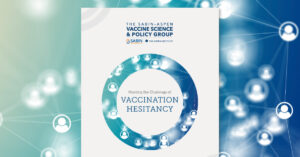Member Spotlight: Sabin Vaccine Institute
Overcoming COVID-19 will require understanding vaccination hesitancy
By Kaitlin Christenson, VP, Vaccine Acceptance and Demand at Sabin Vaccine Institute
The scale of the COVID-19 pandemic has catalyzed a significant effort to develop a vaccine against the disease: today, there are 10 COVID-19 vaccine candidates in clinical trials. As we get closer to the reality of a safe and effective vaccine, which some experts predict could be ready as soon as early next year, we must give careful attention to factors that influence uptake. Most notably, how do we ensure that reliable information is accessible to everyone and strengthens global vaccine confidence to support uptake of a COVID-19 vaccine when it does arrive?
The World Health Organization named vaccine hesitancy, defined as the reluctance or opposition to vaccination despite availability of safe and effective vaccines, as one of the top 10 threats to global health in 2019. Just last year, the United States had the highest number of measles cases in 25 years—an uptick which is attributed to a decline in vaccine confidence. Measles is a highly infectious and deadly childhood disease, and its recent resurgence around the world spells serious trouble for the health of future generations.
As a leading advocate for expanded vaccine access and uptake globally, the Sabin Vaccine Institute (Sabin) recognizes that to improve global acceptance of all vaccines, we must better understand the roots of the problem.
Sabin is dedicated to deepening global understanding of and addressing hesitancy through its new Vaccine Acceptance and Demand Initiative, focusing the lens on increasing vaccination knowledge among media and health care professionals, supporting community-level social and behavioral research to improve our understanding of interventions that successfully build vaccine confidence and studying social media’s influence on vaccination decisions.

Meeting the Challenge of Vaccination Hesitancy, a report published in June 2020 by the Sabin-Aspen Vaccine Science & Policy Group, lays out actionable steps that leaders can take to build confidence in vaccines and vaccinations.
The Sabin-Aspen Vaccine Science & Policy Group, a joint initiative of Sabin and the Aspen Institute, convened 24 experts across public health, medicine, philanthropy, venture capital, biotechnology, biology, ecology, ethics and journalism to discuss the behaviors that influence vaccination hesitancy. Just last week, the group released Meeting the Challenge of Vaccination Hesitancy, a report that illuminates the recommends bold steps to address the problem, including stronger collaboration between social media platforms and the immunization community in order to stem the rising tide of misinformation.
In addition to the report, Sabin supports initiatives to tackle vaccination hesitancy, recognizing the power that local voices around the world hold in identifying the needs of their communities and driving positive social change. Through the Social and Behavioral Interventions for Vaccination Acceptance Small Grants Program, Sabin has already supported grassroots-level intervention projects led by research teams in Uganda, India and Sierra Leone. Sabin recently launched the second iteration of the program, calling for proposals that outline research to improve global understanding about the spread of vaccine misinformation. This research will help generate a body of evidence about the impact that misinformation may have upon routine immunization and acceptance of all vaccines, including a future COVID-19 vaccine. It will also provide insight into demand for other vaccines and generate ideas on potential interventions that can address this proliferation of misinformation.

A group photo of the 2019 Small Grants Awardees from Makerere University School of Public Health in Uganda. Researchers developed a peer group participation model to engage adolescents and increase HPV vaccine uptake.
Though the reasons why people do not vaccinate are complex—a mix of complacency because they have not witnessed the effects of deadly vaccine-preventable diseases, a lack of convenience in accessing vaccines in certain contexts and a loss of confidence in the system that develops and distributes vaccines—the reasons for vaccinating are simple. Vaccines save lives. As members of the global health community we must continue unlocking partnership to ensure that everyone, everywhere has an understanding of the value of vaccination and access to a future free from vaccine-preventable disease.
Kaitlin Christenson is the vice president for Vaccine Acceptance and Demand at the Sabin Vaccine Institute. In this role, she oversees several program areas: educating media and health care professionals on vaccines and immunization, supporting community-level social and behavioral research to understand vaccine acceptance and hesitancy and enhancing understanding of social media influence on vaccination decisions.
The Sabin Vaccine Institute is a leading advocate for expanding vaccine access and uptake globally, advancing vaccine research and development, and amplifying vaccine knowledge and innovation. As a non-profit with more than two decades of experience, Sabin is committed to finding solutions that last and extending the full benefits of vaccines to all people, regardless of who they are or where they live. For more information, visit www.sabin.org and follow us on Twitter, @SabinVaccine.